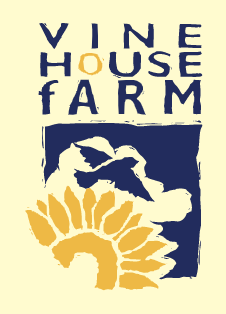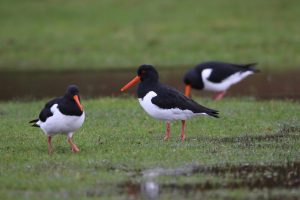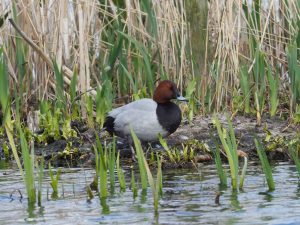
We know April has been a dry month, with only 7.4 mm of rain; our 4th driest April in the last 52 years. It has also been warmer than average, a mean temperature of 9.2°C, the April average being 8.4°C but people have been saying to me I wish it would warm up a bit. Having said that, the last 10 days have not been very warm. There was the warm spell in the middle of the month, that made it warmer than average.

It has been an easy Spring in that we have been able to just keep going. We’ve not been interrupted by wet weather, but that has brought its own problems in that we need rain. The moisture in the soil is being used up by the growing plants and it is also gradually draining away; gravity just keeps working 24/7. We’ve been having quite a lot of sunny days, but on the whole the winds have been light. In April 2020, we had three weeks of sunny weather with moderate to fresh winds. The land dried out so quickly that seeds that were sown didn’t grow and many farmers had a really bad harvest.
Our fields of sunflowers have been sown and we will be expecting them to emerge in around ten days time. Emergence is a critical time for our sunflower crop as if a pigeon, or a pheasant, should peck off the emerging shoot, that would be the end of the plant. Most seeds, once sown, will put a shoot down and then another shoot up and if that initial shoot is pecked off, another shoot will appear later. The sunflower plant puts a shoot down and pushes the seed up; it breaks into two as it emerges to form the cotyledons. If that shoot is pecked off, then that is the end of the plant because the seed has been taken.
The outsides of the fields seem particularly vulnerable to birds eating the emerging shoots so over the past few years we have been covering the outsides of the fields with plastic and that has made sure that we have had a 100% emergence. The plastic, amongst other things, is expensive so we want to try and do without it. So this year, we sowed barley around the edges of one of our sunflower fields, about three weeks before the sunflowers. This has now come up, and by the time the sunflowers emerge the barley will be covering the ground and we are hoping that the birds won’t notice emerging sunflower seeds amongst the barley. As we need to have a crop rotation, there won’t be sunflowers planted opposite the farm this year. We will be having sunflowers in that field again in 2025.
Having a good rotation is the basis of being a good farmer. If we want to be in farming for a lifetime, there are certain crops we cannot grow too often. Potatoes should only be grown every six years, better still every eight years and the same with peas, they are best every eight years. Winter wheat can be grow quite comfortably every other year and spring barley we can grow every year. If we use chemicals, we can grow winter wheat every year but then the grass weeds are difficult to control. Those farmers that have just been growing wheat and oil seed rape, because they have been the two most profitable crops, are now having big problems with grass weeds, they are having to widen their rotation.


April and May are the most delightful months with the return of our Summer visitors. Everyone talks about seeing their first Swallow, which for me was a bit later – April 13th this year. The Cuckoo is the next talking point and for me it was the earliest I had ever heard a Cuckoo, it was when I was on a bird survey south-east of Grantham, on April 17th.
The first one I heard on the farm was on April 26th. Twenty years ago, we seldom heard them on the farm, but now we’ve improved the habitat, have more of their host species and more food for them, I have been able to see and hear them all through May and June these last few years. Their food used to be the hairy Tortoiseshell and Peacock caterpillars as Cuckoos like to eat hairy caterpillars. These caterpillars have declined and the Brown Top moth caterpillar, (another hairy one) has become so common that the hawthorn and Blackthorn in our hedges are fighting to survive, due to their leaves being eaten by these caterpillars.
I was pulling some blackthorn bushes out and I had five or six caterpillars on my neck and I had a very uncomfortable few days. These caterpillars are so numerous, they are swarming everywhere, they must be threatening Tree Sparrow nests as they have been climbing up the next box poles. If five made me uncomfortable, five could potentially kill a nest of Tree Sparrows.
Sedge Warblers and Whitethroats have been with us since the middle of April. I hear the first ones around the middle of April every year – isn’t wildlife amazing, the Whitethroat only weighing half an ounce has to cross the Sahara desert and is never late arriving.
By the time you are reading this newsletter, we will be seeing Swifts, one of our later arriving summer visitors. One bird I am not expecting to see in the wild this Spring is the Turtle Dove, as it has declined by around 90% in the last 40 years. I haven’t heard one on the farm for the past four years.
However, there is some hope as the Turtle Dove Trust is rearing them in quite large numbers in aviaries in Suffolk. They are to be released into the wild the following Spring, hoping that they then will not be migratory. About 250 were reared last year and those will be released soon. When the captive Turtle Doves have laid eggs, they are taken from them and put under Java Doves which sit on the eggs and rear the young. Meanwhile, the Turtle Doves will have laid at least one more clutch of eggs which will also be taken from them to be sat on by another pair of Java Doves. A clutch is of course two eggs like any other dove.
The Turtle Dove trust is looking for funds, if anyone has a soft spot for Turtle Doves and want to get involved with the project please get in touch with me.



